There's Still Over $40BN In Cargo On Container Ships Waiting Offshore
By Greg Miller of FreightWaves
Anchorages continue to fill with waiting container ships off East and Gulf Coast ports, where vessel queues have now far outgrown those off the West Coast. Along all three coasts combined, the number of waiting container vessels remains exceptionally high.
There were 125 container ships waiting off North American ports on Friday morning, according to an analysis of ship-tracking data from MarineTraffic and queue numbers from California.
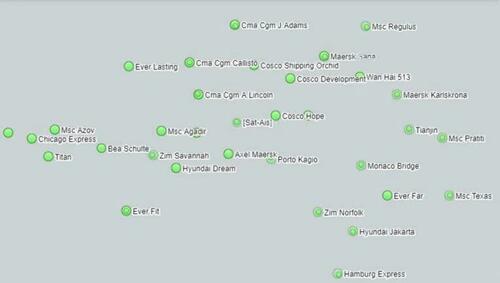
That’s down 16% from 150 waiting ships in January, when West Coast congestion peaked, but up 36% from 92 ships a month ago.
The ship queue off Los Angeles/Long Beach garnered the most headlines over the past year, yet the congestion epicenter has shifted: As of Friday, only 36% of waiting ships were off West Coast ports, with 64% off the East and Gulf Coast ports. Savannah, Georgia, now has the largest ship queue in North America.
Container ships waiting off U.S. and British Columbia ports on Friday had a combined capacity of 1,037,164 twenty-foot equivalent units (TEUs).
How much cargo value is in all those boxes? On a purely back-of-the-envelope basis, assuming 90% utilization (some estimates are higher) and an average cargo value per import TEU of $43,899 (the average value of cargo imported by Los Angeles in 2020, likely conservative given inflation), the estimated value of cargo waiting offshore on Friday exceeded $40 billion.
Volumes shift to the east
Project44 tracks monthly arriving TEU capacity to West Coast versus East Coast ports. It found that June capacity heading to the East Coast was up 83% year on year and up 177% compared to June 2020. East Coast-bound capacity is now on par with West Coast-bound capacity, which has dropped almost 40% since its January peak. Project44 attributed the shift to importer fears of West Coast port labor disruptions.
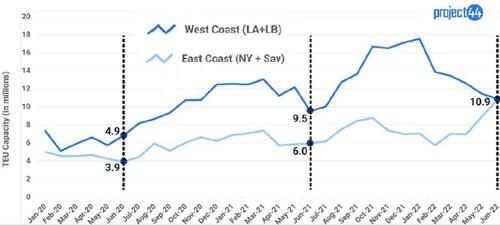
East/Gulf Coast queues
As of Friday morning, MarineTraffic data showed 36 container vessels offshore of Tybee Island, Georgia, awaiting berths in Savannah. The ships had a total capacity of 343,085 TEUs (average ship size: 9,350 TEUs).
A proprietary FreightWaves SONAR index of bookings data shows that growth in inbound volumes to Savannah versus the index date (January 2019) is significantly higher than the national average.

Waiting time for a berth in Savannah is now 10-12 days, according to an operational update this week by Hapag-Lloyd. The carrier put yard utilization in Savannah at 89%.
The second-largest East Coast queue is off New York/New Jersey. On Friday morning, there were 20 vessels waiting with an aggregate capacity of 180,908 TEUs (average size: 9,045 TEUs).
Hapag-Lloyd said waiting time for berths in New York/New Jersey was “running upwards of 20 days depending on the terminal.” Yard utilization was 92% at Maher, 75% at GCT Bayonne and 72% at APM Terminals, added Hapag-Lloyd.
On the Gulf Coast, 20 ships were waiting off Houston with aggregate capacity of 121,196 TEUs (average size: 6,060 TEUs). According to Hapag-Lloyd, utilization at Houston’s Barbours Cut terminal was at 86%, and “terminals continue to experience equipment shortages for chassis due to longer street dwells.”
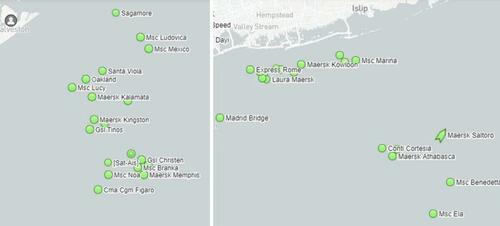
Elsewhere on the East and Gulf coasts, two ships were waiting off Virginia, and another two off New Orleans.
West Coast queues
According to the Friday 7 a.m. queuing list from the Marine Exchange of Southern California, 24 container ships were waiting for berths in Los Angeles/Long Beach, with a total capacity of 208,903 TEUs (average size: 8,704 TEUs).
This backlog is down sharply from a high of 109 ships on Jan. 9, but it’s still the second-largest ship queue in North America. The Los Angeles/Long Beach ship count has been hovering around its current level since late May, and is still up slightly year on year.
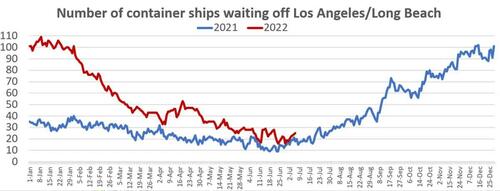
Elsewhere on the West Coast, 10 ships were waiting for berths in Oakland, according to Friday 7 a.m. queueing list from the Marine Exchange of the San Francisco Bay Region. These ships had total capacity of 79,712 TEUs (average size: 7,971 TEUs).
Finally, an additional eight vessels were awaiting berths in Vancouver, British Columbia, with a further three off Seattle/Tacoma.
https://ift.tt/w1jB3DI
from ZeroHedge News https://ift.tt/w1jB3DI
via IFTTT


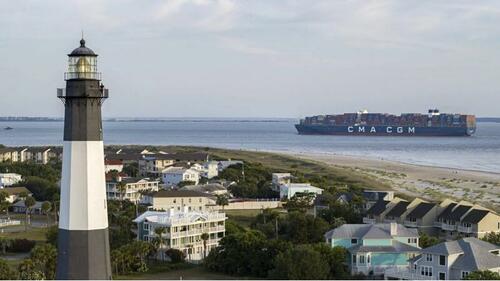


0 comments
Post a Comment